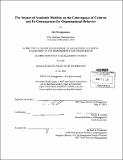| dc.contributor.advisor | Emilio J. Castilla. | en_US |
| dc.contributor.author | Brueggemann, Eric | en_US |
| dc.contributor.other | Sloan School of Management. | en_US |
| dc.date.accessioned | 2013-09-24T19:40:53Z | |
| dc.date.available | 2013-09-24T19:40:53Z | |
| dc.date.copyright | 2013 | en_US |
| dc.date.issued | 2013 | en_US |
| dc.identifier.uri | http://hdl.handle.net/1721.1/81070 | |
| dc.description | Thesis (S.M. in Management Studies)--Massachusetts Institute of Technology, Sloan School of Management, 2013. | en_US |
| dc.description | Cataloged from PDF version of thesis. | en_US |
| dc.description | Includes bibliographical references (p. 101-110). | en_US |
| dc.description.abstract | The age of globalization does not only lead to increased flow of goods around the world, it also tremendously increases the interaction between people from different cultural backgrounds. Management research in the past decade has succeeded in developing recommendations about organizational behavior practices that cater to the idiosyncrasies of the culture of the country a company is located in. While these recommendations adequately address differences in value perceptions of the general population of countries, they do not account for peculiarities that are specific to the senior management of a multinational company. Unlike the general population of a country, this subgroup is mostly composed of individuals that are constantly exposed to an international setting. This study argues that this international exposure, through academic mobility or through professional activities in a global context, deeply impacts the cultural value perceptions of individuals. The setting of MIT Sloan as an international business school is used as a proxy to replicate the senior management setting of multinational companies. A comparison of the national dimensions of culture that exist within this sample is conducted to support the claim that cultures within such a setting converge. I find that individuals within these settings no longer represent a cultural profile that is consistent with that of their home countries but that they rather converge around a specific cultural profile. Based on these findings, contemporary organizational behavior practices for cross-cultural contexts are examined. Potential changes to organizational processes that are derived from the findings in the MIT Sloan sample are described to establish the practical implications of the conducted study. | en_US |
| dc.description.statementofresponsibility | by Eric Brueggemann. | en_US |
| dc.format.extent | 124 p. | en_US |
| dc.language.iso | eng | en_US |
| dc.publisher | Massachusetts Institute of Technology | en_US |
| dc.rights | M.I.T. theses are protected by
copyright. They may be viewed from this source for any purpose, but
reproduction or distribution in any format is prohibited without written
permission. See provided URL for inquiries about permission. | en_US |
| dc.rights.uri | http://dspace.mit.edu/handle/1721.1/7582 | en_US |
| dc.subject | Sloan School of Management. | en_US |
| dc.title | The impact of academic mobility on the convergence of cultures and its consequences for organizational behavior | en_US |
| dc.type | Thesis | en_US |
| dc.description.degree | S.M.in Management Studies | en_US |
| dc.contributor.department | Sloan School of Management | |
| dc.identifier.oclc | 857792780 | en_US |
